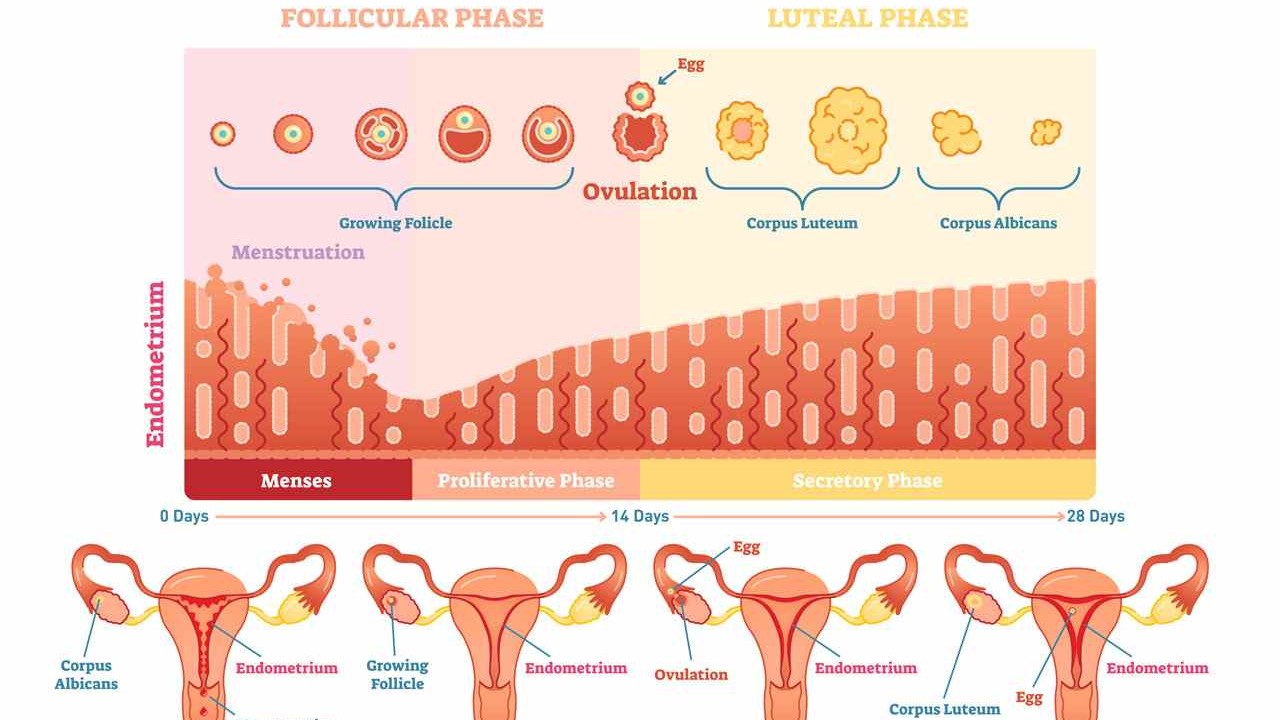The chance of conception is limited to just a few days in each cycle. This guide explains what happens during ovulation, how long an egg remains fertilizable, how to pinpoint your fertile window, and which methods truly help in daily life—clear, evidence-based, and stress-free.
Understanding cycle phases and hormones
- Menstruation (days 1–5): The uterine lining sheds; estrogen and progesterone are at their lowest.
- Follicular phase (days 1 to ovulation): FSH matures a follicle; rising estrogen rebuilds the lining.
- Ovulation (usually days 12–16): The mature egg is released and remains viable for around 12–24 hours.
- Luteal phase (about 14 days): Progesterone from the corpus luteum stabilizes the lining. If pregnancy doesn’t occur, levels drop and a new cycle begins.

What is ovulation?
Ovulation is when a mature egg is released from an ovary and can be fertilized in the fallopian tube. On average, it happens 10–16 days before the next period—not on the same day for everyone. For detailed information, visit the NHS overview.
Numbers & evidence
- Egg: fertilizable for about 12–24 hours after ovulation (NHS).
- Sperm: can survive up to 5–7 days in the reproductive tract, so the fertile window starts before ovulation (NHS).
- Fertile window: around six days total, ending on ovulation day; the highest chance is during the two days before and on ovulation itself (classic data: NEJM Wilcox).
- Everyday recommendation: Intercourse every two to three days covers the fertile window without precise timing (NICE CG156).
Calculating fertile days
For regular cycles, ovulation happens about 10–16 days before your next period. Check this estimate with tracking or tests—variations are normal.
- Knaus–Ogino rule of thumb: First fertile day = shortest cycle − 18; last fertile day = longest cycle − 11. Only a rough guide—don’t rely on it alone.
- Reality check: Even in 28-day cycles, ovulation doesn’t always fall on day 14. Think in ranges, not exact days (see Wilcox).
Methods compared: finding your fertile window
A simple combo works best: use a calendar app as a base, monitor cervical mucus to predict, confirm with basal body temperature, and add an ovulation test if needed. This keeps tracking effective and realistic.
- Cervical mucus: Clear, stretchy mucus means high fertility. Free but takes practice (NICE).
- Basal body temperature (BBT): Measure right after waking up. The rise confirms ovulation retrospectively—good for validation, not prediction (NICE).
- Ovulation predictor kits (OPKs): Detect the LH surge before ovulation and give 12–36 hours of notice (NHS).
- Apps/calendars: Useful for tracking trends but less accurate with irregular cycles.
Ovulation test: quick & correct use
- Start testing four to five days before your earliest expected ovulation date.
- Use the second urine of the day (more concentrated, but not overnight).
- Test at the same time each day and follow the instructions precisely.
- Once positive: plan intercourse that day and the next.
If results remain unclear, a progesterone blood test can confirm ovulation (NICE).
Typical symptoms
- Clear, stretchy cervical mucus
- Mild one-sided pelvic pain (mittelschmerz, not everyone feels it)
- Slight temperature rise the following day (BBT)
Many people feel no obvious signs. Rely more on observation and testing than intuition.
Practical tips
- Keep it low-pressure: sex every two to three days covers the fertile window (NICE).
- Routine matters: check mucus at the same time each day; take temperature right after waking.
- Lifestyle: avoid smoking and alcohol, get enough sleep, and eat balanced meals—basic, evidence-backed health advice (NICE).
Comparison table: which method fits?
| Method | Use | Strength | Limitation |
|---|---|---|---|
| Cervical mucus | Predicts fertile phase | Free, real-time feedback | Requires practice to interpret |
| Basal body temperature | Confirms ovulation afterwards | Inexpensive, objective | Not predictive; daily measuring needed |
| Ovulation test (OPK) | Short-term planning (12–36 hrs) | Clear action window | Cost; proper timing crucial |
| Calendar/app | Cycle overview | Helpful overview | Estimation only if cycles vary |
Myths & facts about ovulation
- “Ovulation always happens on day 14.” It varies widely, even in 28-day cycles. Think in ranges, not fixed days (NEJM Wilcox).
- “If there’s no ovulation pain, it didn’t happen.” Many people ovulate without feeling anything (NHS).
- “Basal temperature predicts ovulation.” It confirms it afterward; mucus tracking and OPKs are better for prediction (NICE).
- “Daily sex boosts fertility.” Every two or three days is enough and less stressful (NICE).
- “Apps can pinpoint ovulation exactly.” They estimate—combining them with body signs and OPKs is more reliable.
- “A negative test means no ovulation.” You may have missed the surge; a progesterone blood test can confirm it (NICE).
- “You’re only fertile on ovulation day.” Sperm can live up to seven days; fertility starts earlier (NHS).
- “Irregular cycles mean infertility.” Variations are common. The key is whether ovulation occurs—consult a doctor if unsure.
Irregular cycles: when to see a doctor
If your periods vary a lot, stop completely, or ovulation remains unclear despite tracking, it’s worth getting checked. Common causes include thyroid issues, PCOS, weight extremes, or high stress. A doctor can confirm ovulation with a progesterone blood test (NICE CG156). For background, see the WHO infertility fact sheet.
Conclusion
The egg is fertilizable for just 12–24 hours, while sperm can survive up to 5–7 days. The key is the fertile window before and including ovulation day. A calm, combined approach using a cycle app, cervical mucus tracking, basal temperature for confirmation, and an ovulation test when needed is reliable. If conception doesn’t happen or cycles are irregular, early, guideline-based evaluation helps.

